The movie is very funny, effortlessly moving, stylishly made, impeccably acted by a mind-bogglingly great cast — and, yes, wholly satisfying. While it’s very much in the mould of Curtis’ previous scripting efforts, there is a notable difference here in terms of size and scope. Putting it strictly within the realm of Curtis’ other works, Love Actually probably mostly resembles Four Weddings and a Funeral — but multiplied by four. But thinking outside of the Curtis oeuvre, this is a film that more resembles a Robert Altman multi-character study — rethought as a romantic comedy. Yet even that doesn’t entirely cover it, since Curtis has managed to work in a story — and something of a structure — that owes more than a little to the Weitz brothers’ About a Boy (one of the few good British comedies of recent years not written by Curtis). And having part of the plot hinge on a novelty Christmas song also links these two films — which may make Love Actually sound like it has no identity of its own. Nothing could be further from the truth.
Rather, this is a movie firmly grounded in — and conscious of — the popular culture of its day, and it doesn’t pretend to exist in a vacuum. It’s also a remarkably complex work that’s done something of a disservice in bearing the label “romantic comedy,” because while that certainly implies something that Love Actually is, it also suggests something that it is not. This isn’t just a movie about traditional romance, but about love in all its many and sometimes unlikely incarnations — including various forms of familial love and friendships. It is, in fact, this broadening of the concept — along with Curtis’ incredible ability to interconnect all his stories and keep them from becoming confusing — that edges Love Actually into the realm of greatness.
The movie is almost impossible to synopsize, boasting as it does such a large number of characters and stories, all connected on some level, but all also complete in themselves. Opening on the assertion that the world isn’t a horrible place, but rather one where “love actually is all around,” Love Actually makes an improbable move to its seemingly most tangential and unlikely character — burned-out, 50-odd-year-old rocker Billy Mack (Bill Nighy). Desperate for a comeback via a hit Christmas song (a concept more relevant in Britain than the States), Billy is struggling to get through a novelty reworking of “Love Is All Around,” awkwardly turned into “Christmas Is Everywhere” — an indigestibly gooey confection that Billy know is total crap, and he can’t keep from blurting out that fact. Though Billy seems to exist only to bedevil his long-suffering manager (Gregor Fisher), and he never directly interacts with the rest of the cast, his character — and his constantly self-sabotaged attempts at reaching No. One (“Don’t buy drugs, kids. Become a pop star and they’ll give them to you for free!”) — is the brilliant and brilliantly funny link that holds the film together. (And it results in a very funny parody of Robert Palmer’s “Addicted to Love” video — reworked, of course, for Christmas.)
The stories proper — Hugh Grant as a newly elected prime minister with a yen for a servant with a penchant for familiarity and bad language at inappropriate moments (Martine McCutcheon); Colin Firth as a writer of doubtful talent trying to get over a cheating girlfriend by authoring a novel abroad; Liam Neeson as a widower dealing with the first love of his stepson (Thomas Sangster); Alan Rickman as a businessman tempted to cheat on his wife (Emma Thompson); Andrew Lincoln as a young man hopelessly in love with the new wife (Keira Knightley) of his best friend (Chiwetel Ejiofor); Laura Linney as a love-struck employee of Rickman whose chances of romance are thwarted by her devotion to a mentally ill brother; and even more — serve to wittily and movingly support the movie’s theme.
Most amazing is the way in which Curtis keeps all these stories moving in an uncluttered and completely coherent manner. By the time Love Actually reaches several climaxes being intercut at once, you know you’re in the presence of a true filmmaker. No simple review can even begin to catalogue all the events in this film, much less celebrate them effectively. And the acting … well, the acting is exactly the caliber you expect. Hugh Grant just gets better with each passing year — and he wears those years well (even when he complains that, in aging, he looks more and more like his Aunt Mildred) — going considerably beyond his well-worn, but still-engaging standard screen character. There’s much here that is pure Grant (as there should be), but other things that are fresh — as when his character stands up to the bullying American president (Billy Bob Thornton) in an apparent deliberate slap at Britain’s current real-life prime minister. Emma Thompson ought to get a Supporting Actress nod for her role as Alan Rickman’s much put-upon wife (and almost equally neglected sister of the Grant character). Liam Neeson has rarely been this good, or this likable. And on and on and on.
If you must register a complaint, gripe that Chiwetel Ejiofor is underused — but, honestly, who knew he was this good prior to Dirty Pretty Things? It’s all here and it’s all splendid—and with one of those wonderful pop-music soundtracks that only the British put together this well, and this aptly. I can’t think of a better movie for Christmas — or maybe even for the whole year.
The Asheville Film Society will screen Love Actually Tuesday, Dec. 15, at 8 p.m. in Theater Six at The Carolina Asheville, hosted by Xpress movie critic Ken Hanke.




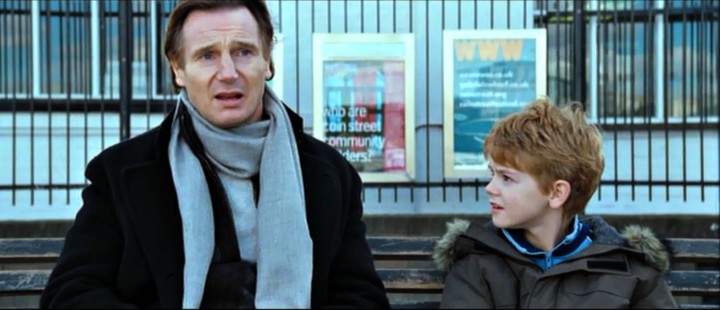

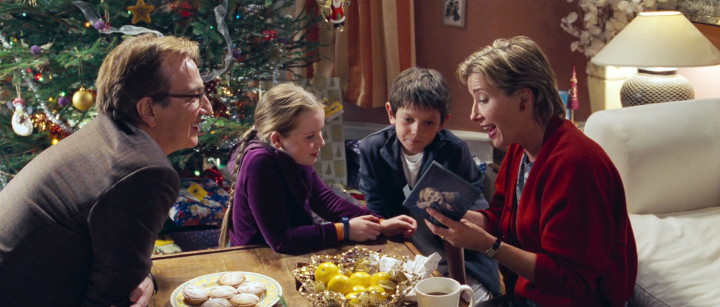
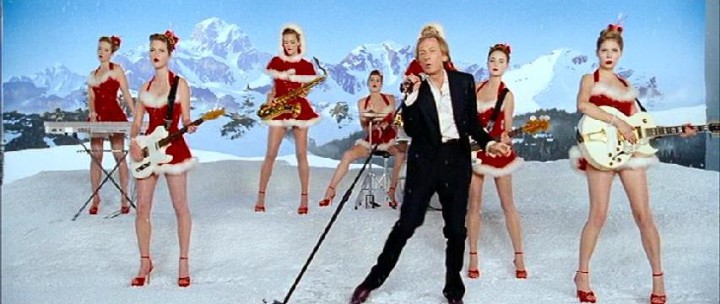
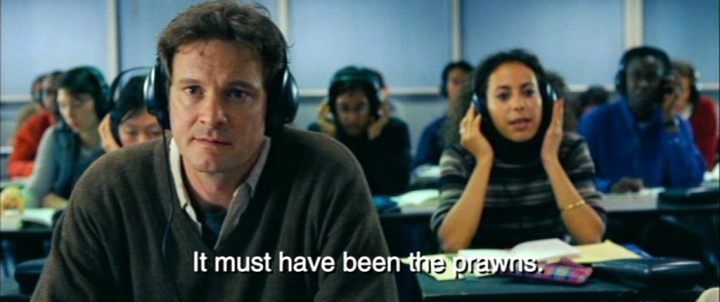
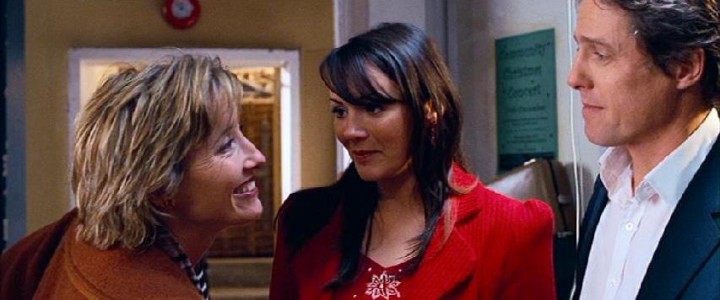
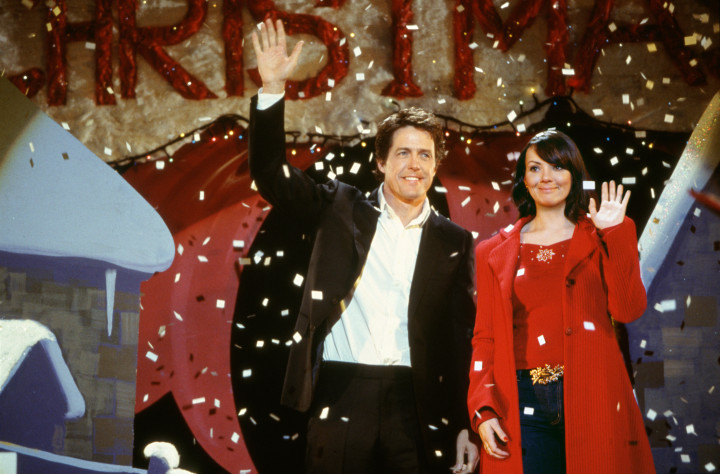

This movie makes my “one-off” list, i.e. the first time I saw it, I said “Wow! Game -changer!”, but subsequent viewings made me think, “What was the BFD?”
Danny Boyle’s “Millions” (also a Christmas story) and the Thanksgiving film “Pieces of April” also made the list.
Maybe it is something about the holidays? I also find myself less likely each year to watch my traditional Christmas favorite “White Christmas”. I will admit that my initial attraction was to the soldier-buddy story, of which I have grown more and more cynical of as my days in Pharaoh’s army grow more distant.
Who can say? Personally, I’ve never cooled toward this or Millions. Never saw Pieces of April and never liked White Christmas (I’ll take Holiday Inn). I will admit that the last has something to do with having a very, very low tolerance for Danny Kaye.